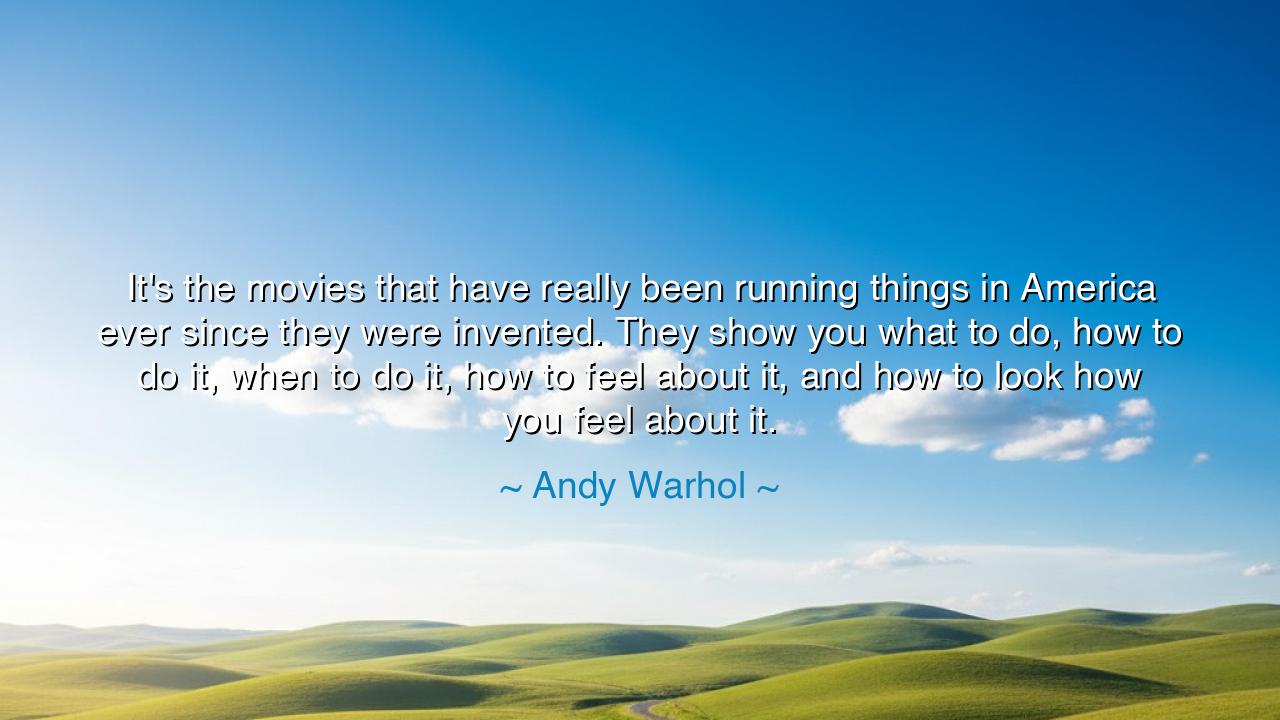
It's the movies that have really been running things in America
It's the movies that have really been running things in America ever since they were invented. They show you what to do, how to do it, when to do it, how to feel about it, and how to look how you feel about it.






Hear the prophetic words of Andy Warhol, painter of icons and prophet of popular culture: “It’s the movies that have really been running things in America ever since they were invented. They show you what to do, how to do it, when to do it, how to feel about it, and how to look how you feel about it.” Though spoken with the cool irony that marked his style, within them lies a truth both unsettling and profound: that cinema is not merely entertainment, but a teacher, a mirror, and at times, a master.
The meaning of this saying lies in the transformative power of images. For since the birth of the motion picture, people have not only watched the screen, they have absorbed it. The movies have shaped gestures, language, clothing, romance, and even morality. They do not merely reflect society—they instruct it. Warhol, who understood better than most the tyranny of appearances, saw that the glowing screen had become the great oracle, whispering to each person not only how to behave but how to feel about their behavior, and even how to arrange their faces so that their emotions appeared correct.
The origin of this thought may be traced to the golden age of Hollywood. When Greta Garbo appeared upon the screen, her gaze became the model of mystery; when James Dean walked with restless rebellion, a generation copied his stance; when Audrey Hepburn smiled in Breakfast at Tiffany’s, countless women learned that elegance was not merely about wealth but about poise. These were not accidents—they were the lessons of cinema, quietly instructing the masses in what beauty, love, and heroism should look like.
Consider also the story of World War II propaganda films. America, uncertain in its entry into the war, found itself rallied by movies that depicted courage, duty, and sacrifice. The soldier on the screen became the model for the soldier in life; the citizen in the theater learned from the actor how to face rations, waiting, and sacrifice. The movies taught the people not only what to think but how to feel about their nation, their enemies, and themselves. Thus, Warhol’s words ring with historical weight: cinema shaped not only fashion, but the very pulse of national will.
And yet, Warhol’s remark also carries a warning. For if movies run things, then they wield power greater than kings, greater even than laws. They instruct silently, shaping millions without need for decree or command. This is both a marvel and a peril. For just as films can inspire courage, tenderness, and unity, so too can they breed vanity, violence, and despair. When people learn not from wisdom but from spectacle, they risk mistaking illusion for truth. Warhol’s genius lay in pointing to this paradox with both fascination and unease.
The lesson for us is clear: do not watch passively. Understand that every image you see, every story you behold, carries a hidden lesson about who you should be, how you should feel, and what you should desire. Ask yourself: Who is teaching me here? What am I being shown to value? Is this truth, or merely glamour? By questioning, you reclaim your power from the screen; by awareness, you transform from pupil to master.
So, children of tomorrow, remember the wisdom in Warhol’s irony: movies may run things, but you need not be their slave. Watch them, enjoy them, even learn from them—but do so with eyes open and spirit awake. Take from them what uplifts, discard what corrupts, and remember that the greatest movie is the story you yourself are living. For though the screen may instruct you how to look, only you can choose how to truly be.






AAdministratorAdministrator
Welcome, honored guests. Please leave a comment, we will respond soon